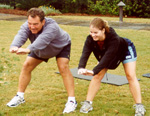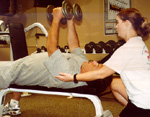Kiawah Island, home of new health program
by Heather MurphyPublic Relations
Ron Gerhart and Brandy Cowell weigh the options.
Will it be a vegetable omelet, fruit and toast, or maybe a bowl of oatmeal with some almonds and fresh fruit? Gerhart listens intently as Cowell describes calorie, fiber, sugar, and carbohydrate intake.
An omelet it is.
 Ron
Gerhart and Lauren Williams stretch before hopping into the pool for a
water aerobics class.
Ron
Gerhart and Lauren Williams stretch before hopping into the pool for a
water aerobics class.
Gerhart is the 55-year-old owner of a Virginia advertising agency and the first participant of the Charleston Health Institute (CHI). After two weeks, he feels great.
“I’ve lost 19 pounds and my cholesterol’s down 100 points,” he said. “But I don’t feel deprived at all. It’s not boot camp. It’s a life changing experience in an unbelievable atmosphere.”
That atmosphere belongs to Kiawah Island Resort, the home of CHI and arguably one of the biggest resort attractions in the Southeast.
Complete with ocean views, fine dining, a world-renowned golf course, luxury suites, first class customer service and a semitropical climate, “Kiawah provides an atmosphere of serenity,” said Peter Miller, Ph.D., and director of CHI.
“The Charleston Health Institute has the unparalleled combination of a major resort, a leading medical institution, the beauty of the city of Charleston, and the leadership of an experienced wellness authority,” he said.
Miller, who has 25 plus years of experience in executive health institutes, describes the goal of CHI as becoming the premier executive health and wellness program in the country and feels this goal is attainable given this combination of elements.
CHI works closely with the Medical University and its Executive Health Program to offer participants a wide variety of services.
 Williams
spots Gerhart as he works on his strength training. Williams works to emphasize
the importance of good form when working with weights.
Williams
spots Gerhart as he works on his strength training. Williams works to emphasize
the importance of good form when working with weights.
It is a “medical retreat” including classes, seminars, and instruction on nutrition, exercise, stress management, and overall individual wellness. Participants have the opportunity to spend a day at MUSC upon arriving in Charleston to receive a barrage of tests ranging from blood pressure and stress tests to more specific testing.
Mark Lyles, M.D., associate dean of clinical operations for MUSC, is the medical director of the MUSC Executive Health Program. Lyles works closely with the CHI staff to address the needs of guests.
“What we offer to CHI and Executive Health Program participants is more amenities, more accessibility and an element of time saving, not a different level of care. We deliver the same quality of care to all our patients at MUSC. Being able to have all of the necessary tests done and the results back in one day is a very beneficial option for busy executives.”
“This will augment our national visibility and provide a new stream of patients for our health care system,” said Ray Greenberg, M.D., Ph.D., president of MUSC. “At the Medical University, we have an excellent system for caring for persons who are ill. We could be even more effective in improving the health of the population if we could keep people from getting sick in the first place. CHI is designed to meet that need and it draws upon the knowledge and expertise of Dr. Miller, a nationally recognized leader in health promotion.”
Like many busy executives, Gerhart knows what it’s like to lose weight and initiate some positive changes, but does not always have the best of luck when it comes to making them stick. He’s found that the bottom line is maintaining his goal once he reaches it.
“What I’ve learned here is the concept of ‘mindfulness.’ I’ve learned that good health is not just about eating the right things and exercising, it’s also about stress management through those two things. If you can control your stress level, it means that you are more in control of your eating habits and exercise regimen,” Gerhart said.
“I want our patients to realize that this program is not about dieting, it’s about healthy lifestyle changes,” said Brandy Cowell, CHI dietician. “Our job is to provide participants with the knowledge to make those changes permanently.”
Cowell’s curriculum is based on participants’ goals, and includes classes
and one-on-one discussions concerning eating out, going to the grocery
store, portion control and counting calories, and basic nutrition. She
also explains the Charleston Diet, a Mediterranean style menu plan
that participants eat during the visit.
The menu focuses on vegetables, whole grains, fruits, nuts, seeds,
and lean proteins like fish and seafood.
“In my profession, going out to dinner or lunch is an intricate part of business communications, not to mention our culture in general. You need to be able to find healthy alternatives without being the ‘hold this, add that, or no butter on that please’ guy,” Gerhart said.
Knowing how excited most people get about strenuous exercise, CHI fitness coordinator David Sword sought to initiate a fitness program that was anything but run of the treadmill.
“We understand that one size does not fit all. Not everyone likes to bike, jog or swim every day, so we like to introduce a variety of options,” he said.
Sword’s program includes nature walks on the beach, yoga by the ocean, canoeing trips, biking, jogging, water aerobics and NIA (Neuromuscular Integrative Action), a free form movement exercise that combines aspects of yoga, dance, and martial arts.
The idea is to instruct participants in a variety of different activities, strength and stretch training so they take home practical exercise regimens.
“We teach 30-minute strength sessions with dumbbells that are very easy to incorporate at home,” said Lauren Williams, CHI exercise physiologist.
“We put together a total body workout that has options. For example,
we may give the participant three shoulder exercises that they can do but
tell them that they only need to rotate through two of those when they
are working out.”
Both fitness gurus recommend the safety of a low intensity workout,
as low-to- moderate intensity workouts can still have excellent health
benefits. Sword mentioned that it’s better for the participant to leave
the session feeling like he or she could have done more rather than feeling
wiped out.
“The main selling point in the beginning was access to state-of-the-art medical testing through a prestigious medical institution. Now, I’ve realized that the program itself is so expansive. You get it all under one roof,” Gerhart said.
Gerhart described his attitude now, versus upon his arrival, as more positive, and reported that he’s sleeping better, his minor aches and pains are gone, and has dramatically increased his flexibility. “I have a goal to run a 5K in a couple of months. Several weeks ago, I never thought it would have been possible,” Gerhart said.
“Participants are either self-referred or are referred by a health professional like a physician,” said Cindy Ware, enrollment coordinator for CHI. Ware also stated that although the schedule is set before people arrive, it might be modified if someone can’t participate in a certain class. Participants have a schedule every day of the visit from 7 a.m. until dinnertime.
CHI is owned by the MUSC Foundation for Research and Development, an organization created to benefit MUSC and does not use state tax monies to run the program, although the majority of CHI staff are leased by CHI from MUSC.
“These programs are paid by participants or places of business. MUSC needs resources. The money that comes into the CHI program filters back into MUSC programs for all types of people. MUSC does have to gear somewhat towards the “self-pay” population in order to help achieve financial stability,” Miller said.
“CHI is a wonderful way to build MUSC’s image because it introduces MUSC services and physicians to a particular group of people that may never have thought of MUSC before,” Lyles said.
Catalyst Online is published weekly, updated as
needed and improved from time to time by the MUSC Office of Public Relations
for the faculty, employees and students of the Medical University of South
Carolina. Catalyst Online editor, Kim Draughn, can be reached at 792-4107
or by email, catalyst@musc.edu. Editorial copy can be submitted to Catalyst
Online and to The Catalyst in print by fax, 792-6723, or by email to petersnd@musc.edu
or catalyst@musc.edu. To place an ad in The Catalyst hardcopy, call Community
Press at 849-1778.